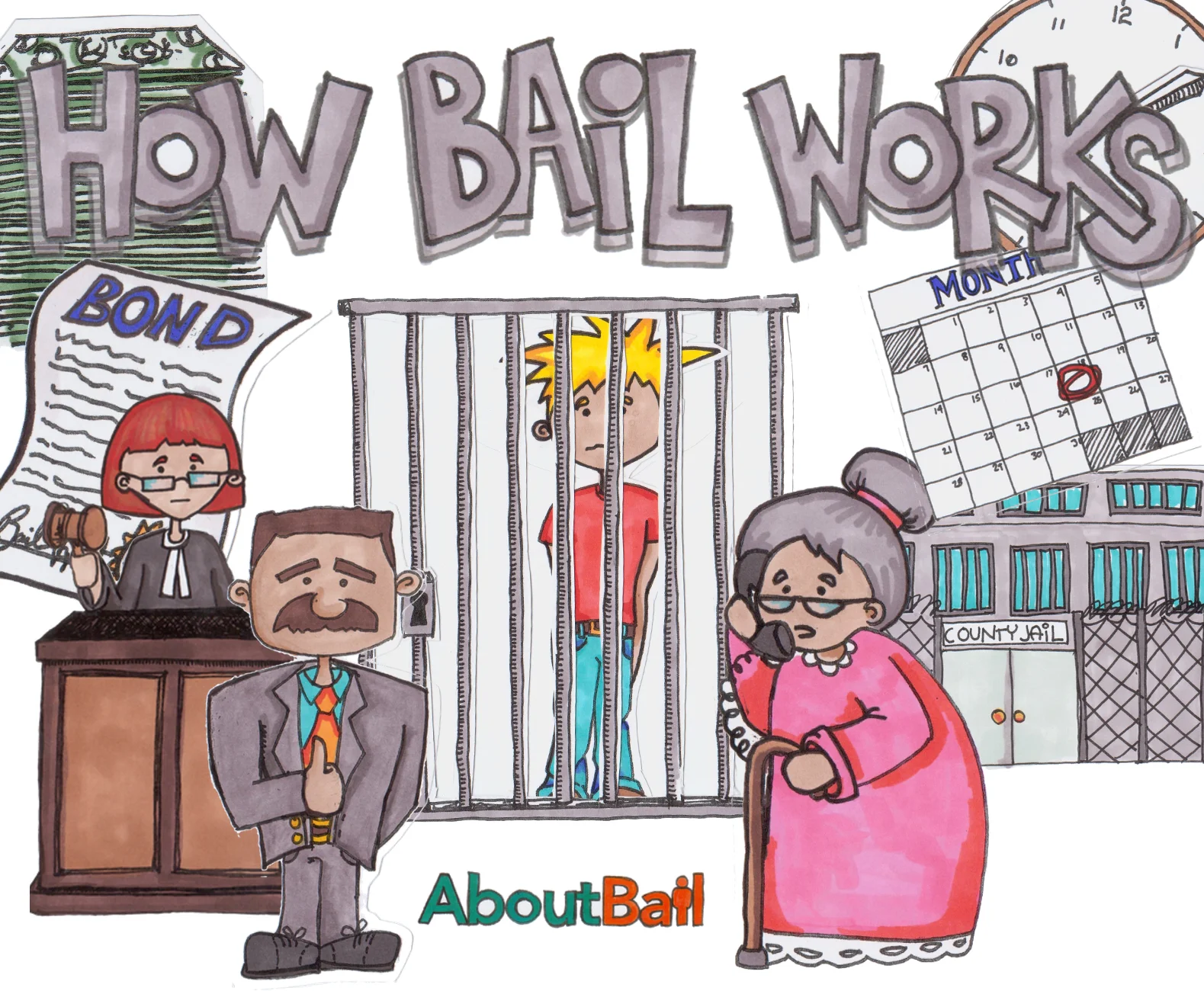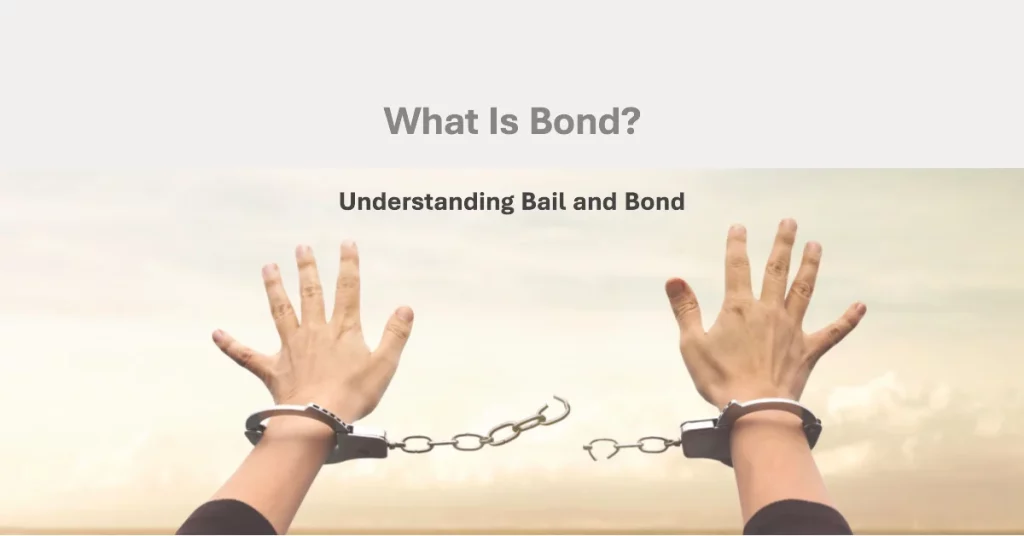What is the Difference Between Bail and Bond?
Did you know What is the Difference Between Bail and Bond? These both terms commonly use in the legal system, especially in criminal cases. They often use interchangeably, there are distinct differences between them.
We will guide comprehensive overview of the differences between the concepts of “bail” and “bond”.
What is Bail?

Bail is the money or property that a defendant (the person accused of a crime) pays to the court in exchange for their temporary release from custody before their trial. Its a guarantee or assurance that the defendant will appear in court for their scheduled hearings. Bail can be granted in various forms, including cash, property, or surety.
Legal Terms and Conditions:
- The defendant must attend all required court hearings.
- The defendant should not commit any other criminal offenses while on bail.
- The defendant may be subject to additional restrictions or requirements, such as staying away from certain locations or people.
How Does Bail Work?

When someone gets arrested, they usually have a bail hearing. At this hearing, a judge decides if the person can be release from jail before their trial. If the judge allows bail, the person or someone representing them has to pay a certain amount of money or give something valuable as collateral. This is like a promise that the person will come back to court for their trial. If they don’t show up, they might lose the money or collateral, and the police might arrest them again.
Types of Bail
- Cash Bail: Defendant or their representative pays the entire bail amount in cash.
- Property Bail: Property bail involves using real estate or other valuable assets as collateral for the bail amount. If the defendant fails to appear in court, the property may be seized to cover the bail.
- Surety Bail: Surety bail involves obtaining a bail bond from a licensed bail bondsman. The bondsman charges a fee, usually a percentage of the total bail amount.
- Personal recognizance: the defendant is released without bail on the some one promise that they will appear in court.
Advantages and Disadvantages of Bail
Bail has its advantages and disadvantages, both for the defendant and the judicial system.
Bail allows defendants freedom, continue working, and support their families while awaiting trial. It also helps reduce overcrowding in jails. It provides an opportunity for defendants to actively participate in their defense and access legal representation.
Bail can be financially burdensome for individuals who cannot afford the required amount. This can lead to disparities where wealthy defendants can secure their release while others cannot. There is always a risk that the defendant may flee or engage in criminal activity while on bail.
What is a Bond?

Bond is a type of insurance policy that is purchased by the defendant or their family. Its is a guarantee provided by a third party known as surety company or a bondsman to secure the release of a defendant. A bail bond company will post a bond with the court for a fee, typically 10% of the bail amount.
Legal Terms and Conditions:
- The defendant must attend all required court hearings.
- The defendant should not commit any other criminal offenses while on bail.
- The defendant may be subject to additional restrictions or requirements, such as staying away from certain locations or people.
How Does a Bond Work?
A bail bond company will post a bond with the court for a fee, typically 10% of the bail amount. The surety company then provides the bond to the court, securing the defendant’s release. If the defendant appears in court for all of their scheduled court dates, the bond is returned. However, If the defendant fails to appear in court, the surety company will paying the full bond amount to the court or hire a bounty hunter to locate and return the defendant to custody.
Types of Bonds
There are different types of bonds available depending on the jurisdiction and the nature of the case. The most common types include:
- Cash Bond: Similar to cash bail, a cash bond requires the defendant or their representative to pay the full bond amount in cash.
- Property Bond: Property can be used as collateral for a bond. The value of the property must meet or exceed the bond amount.
- Immigration bond: used for non-citizens who are detained by immigration authorities.
- Federal bond: used for federal crimes.
Advantages and Disadvantages of Bonds
One advantage of using a bond is that it allows defendants who cannot afford the full bail amount to secure their release by paying a smaller percentage. This makes the option more accessible to individuals with limited financial means.
However, bonds also come with fees and non-refundable charges, which can be costly for the defendant or their representative. If the defendant fails to appear, bondsman may take legal action to recover the bond amount.
Read related post : Difference between murder and homicide
Differences Between Bail and Bond
Definition Differences
Bail refers to the security or collateral provided to ensure the defendant’s appearance in court, while a bond is a financial instrument provided by a surety company or bondsman.
Legal Implications
Bail is granted by the court, whereas a bond is issued by a surety company or bondsman. The court sets the terms and conditions for bail, while a bond is agreement between the defendant and the surety company.
Financial Implications
Bail requires the full amount to be paid in cash or collateral, whereas a bond requires only a percentage of the total amount, usually 10%. This makes bonds a more affordable option for defendants who cannot afford the entire bail amount.
Conditions and Requirements
The conditions and requirements for bail are determine by the court like restrictions on travel, mandatory check-ins, or participation in rehabilitation programs. Bonds typically have few conditions, but defendants are still required to appear in court for all proceedings.
Process and Release
When bail is pay, the defendant is released from custody. In the case of a bond, the surety company or bondsman facilitates the release.
Here is a table that summarizes the key differences between bail and bond:
| Characteristic | Bail | Bond |
|---|---|---|
| What is it? | A sum of money that is paid to the court | A type of insurance policy |
| Who pays it? | The defendant or their family | The defendant or their family |
| What happens if the defendant appears in court? | The bail money is returned | The bond is returned |
| What happens if the defendant fails to appear in court? | The bail money is forfeited | The bail bond company is responsible for paying the full bail amount to the court |
| Cost | Typically less expensive than bond | Typically more expensive than bail |
| Availability | May not be available to all defendants | May be the only option for defendants who cannot afford to pay bail |
Which One is Right for You?
Determining whether bail or a bond is the right option depends on various factors. It’s essential to consider the following:
- Financial Situation: Evaluate your financial means and determine if you can afford the full bail amount or a bond is good option.
- Legal Circumstances: Consult with attorney requirements for your case.
- Risk Assessment: Assess the likelihood of you or the defendant complying with the conditions of release. If there are concerns about potential flight or non-compliance, a bond may provide more security.
Refence links


